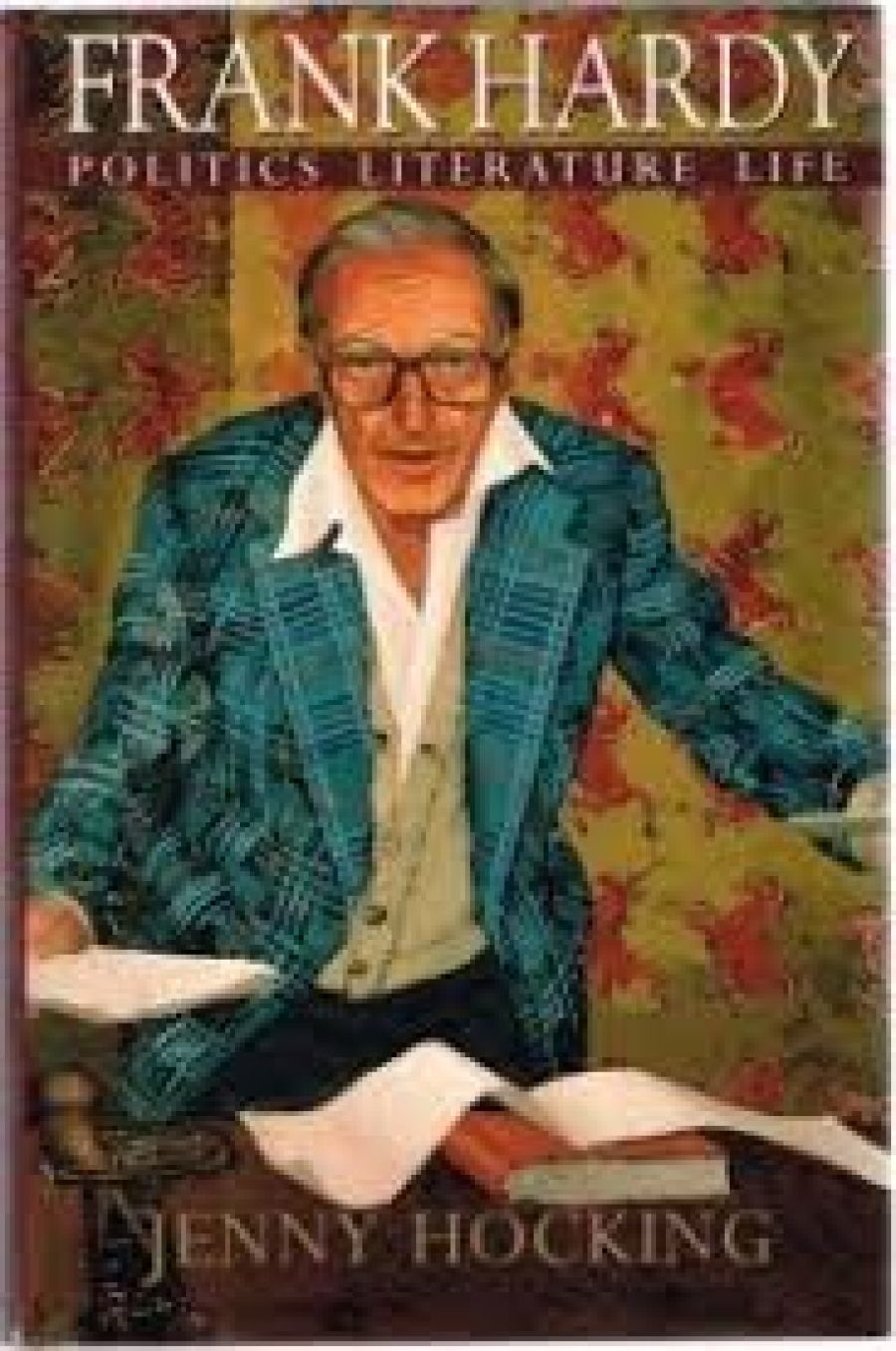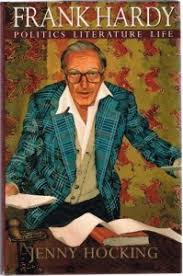
- Free Article: No
- Contents Category: Biography
- Review Article: Yes
- Article Title: A good salesman
- Online Only: No
- Custom Highlight Text:
In reading a biography of Frank Hardy, it is almost impossible to separate the man, as subject, from the work for which he is famous, the novel Power Without Glory (1950) based on the life of John Wren. If I did not want to reach for my gun every time I hear the word ‘icon’ these days, I would say that this novel still has iconic status in Australian culture. The title is a pithy reworking of Graham Greene’s novel The Power and the Glory (1940), about the ethics of a Catholic priest in southern Mexico. Like Greene, Hardy was driven by a quasi-religious commitment, but for him it was a lifelong commitment to the Communist Party of Australia (CPA) rather than to Catholicism.
- Book 1 Title: Frank Hardy
- Book 1 Subtitle: Politics, literature, life
- Book 1 Biblio: Lothian, $39.95 hb, 310 pp
- Book 1 Cover Small (400 x 600):

- Book 1 Cover (800 x 1200):

Power Without Glory made its mark in Australian letters so ineradicably because it was the subject of a criminal libel case brought against Hardy for his thinly disguised representation of Ellen Wren as ‘Nellie West’ (Hardy used fictional names that were modelled very closely on actual names). In the book, Ellen is portrayed as the adulterous wife of the infamous Collingwood identity, John Wren, millionaire and Labor Party puppeteer during the middle decades of last century. The CPA had funded Hardy during the secret writing of his novel, because it wanted to expose the corrupt practices of the ALP in Collingwood and Richmond. Reading the novel many years ago because I thought I should, I recall finding its socialist-realist narrative tedious.
Jenny Hocking argues that guilt at his betrayal of the privacy of Ellen Wren haunted Hardy for the rest of his life. Hocking claims that Hardy became obsessed with the relationship between truth and literature, a preoccupation that continued throughout his writing life. This idea functions reasonably effectively as a hook on which to hang the biography, but it seems a little too simple to be allowed to pass without interrogation. Surely all writing or narrative is in some sense ‘fiction’, and ‘Truth’ as an absolute value is a slippery and subjective concept? Hocking does not consider this. Nor does she note that Hardy’s continuing struggle with this question was a doomed exercise. All he could sensibly hope to achieve was a self-conscious ethical framework for his writing, which, by and large, he did.
This is a non-judgmental and informative life study: Hardy’s tireless political activism on behalf of the left, his work as a public figure and as a writer, his late career as a media personality, his disastrous private life (his drinking, gambling and serial adulteries), all flesh out the man and his world. I felt real sympathy for his wife, Rosslyn, as Hardy could hardly have been an easy man to live with. He was hopeless with money and prey to sudden infatuations with women. Nonetheless, he must have had charm, small and ugly though he was. I was amazed to discover that Nana Mouskouri was one of his conquests. According to Ian Turner (admittedly speaking here about the establishment of the Australasian Book Society rather than about his appeal to women), Hardy had attractive qualities: ‘larrikin, big spender, bon viveur, raconteur, lair – Frank was a good salesman.’
I was occasionally disappointed by Hocking’s prose: she consistently uses ‘disinterested’ when she means ‘uninterested’, and other mistakes bypass an automatic spellchecker, which an editor should have picked up (‘canvas’ for ‘canvass’, for example). Notwithstanding this, the book’s real strength is its non-partisan representation of the cultural politics in which Hardy was everlastingly embroiled. I particularly enjoyed the story of Hardy’s dispute with Stephen Murray-Smith over control of Overland, and was fascinated by the detailed account of the fortunes of the CPA. Although this struggle seems to be well and truly over, these are the formative politics of my childhood, the Cold War politics of the Menzies era, the politics that, in a different way, formed John Howard. Today, we can continue to admire Hardy’s prescience and social conscience in his work for the land rights of the Gurindji people, long before this debate was established in the general political consciousness.
Hardy as subject is by no means idealised, but nor is he demonised. As he is represented in this book, he was an unapologetic warrior for the left, and his belief in the direct role of literature in the political struggle was unflagging. Although he came eventually to recognise the terrible crimes of Stalinist politics, Hardy still declared, in an interview given in old age, that ‘literature was about justice, and overthrowing tyranny and fighting against the powers of evil that run capitalism’. This might sound dated, but given the primacy today of ruthless market economics and the passing from public discourse of values driven by a desire for social justice for all, this life of Hardy is a poignant reminder of ideals that are no longer fashionable.


Comments powered by CComment